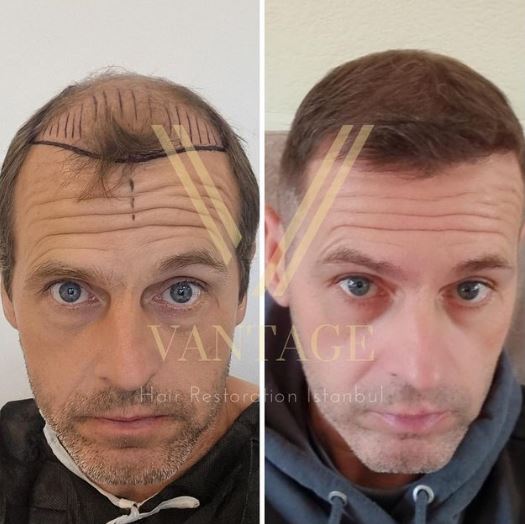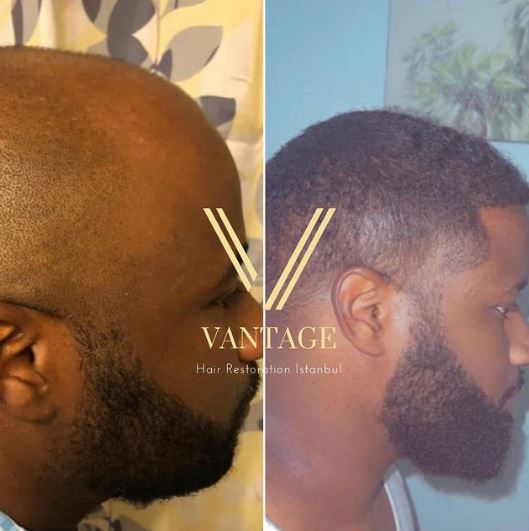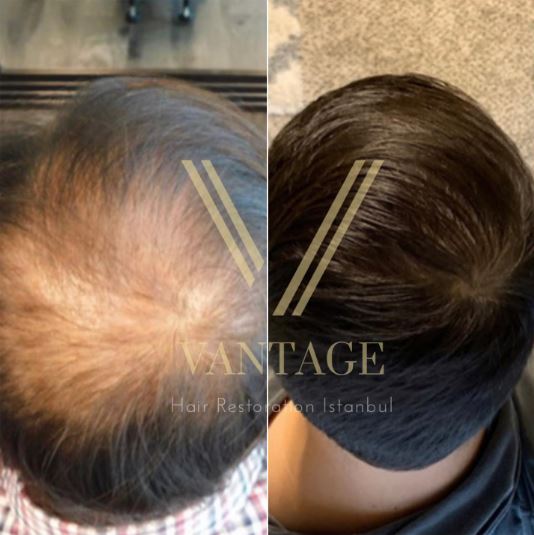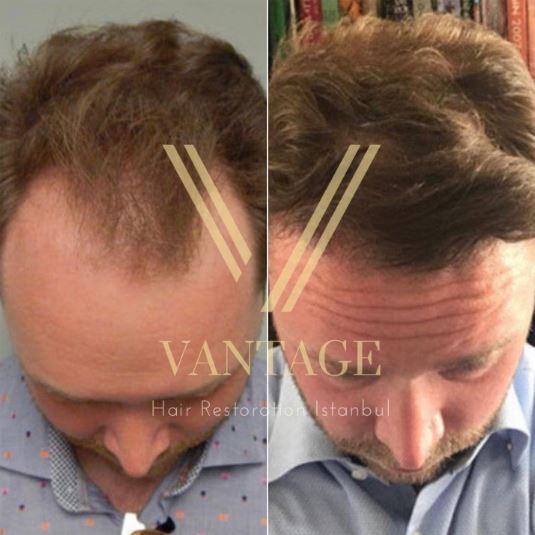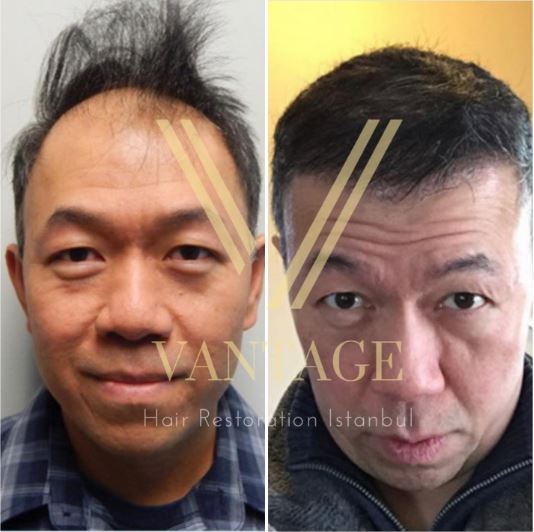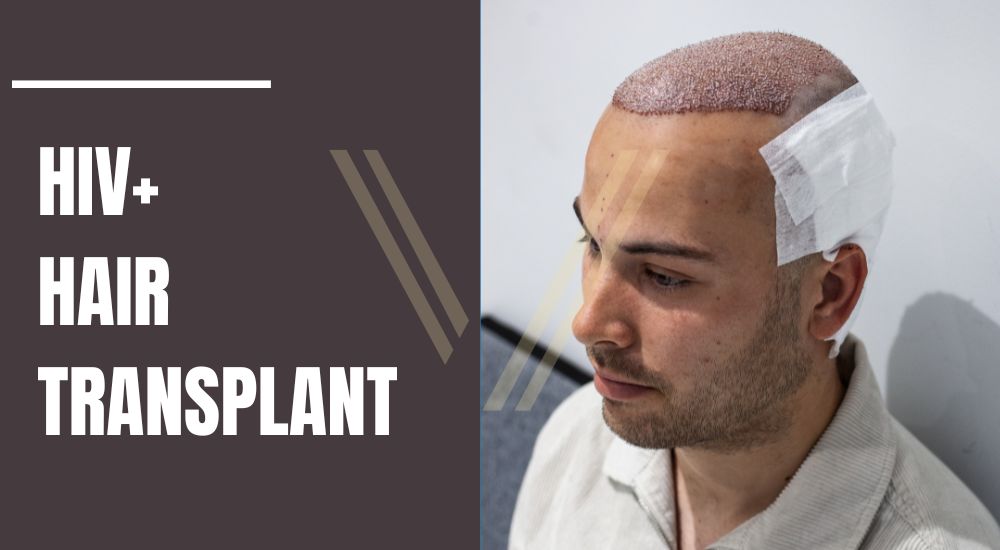
Hair loss is a common issue that affects many people. It can be caused by aging, hormonal imbalances, and diseases. People with HIV may experience hair loss due to a viral infection that attacks the immune system and interferes with its functions. Although not proven, hair loss can also be a symptom of HIV.
Many treatments are available for hair loss, such as ointments, drugs, and herbal remedies, but none can provide a permanent solution. However, a hair transplant is a highly effective and popular treatment for hair loss. It is a sophisticated method that is widely used all over the world. Even HIV-positive patients can undergo a hair transplant. Today, HIV-positive hair transplants can be conducted with utmost care in Istanbul, Turkey that provides long-lasting satisfactory results.
Let’s have a look at the eligiblity, procedure, prices and other frequently asked questions about HIV hair transplants.

One Patient at a Time

In-house Team

No Hidden Fees
Does HIV cause hair loss?
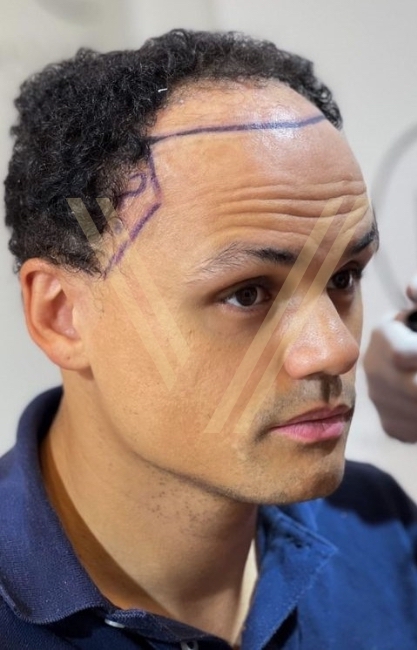
HIV, short for human immunodeficiency virus, is a severe disease that directly attacks the immune system. Common symptoms of HIV include fever, fatigue, sore throat, swollen lymph nodes, and rash. Although hair loss may not be listed as the primary symptom of HIV, many people with HIV experience this condition. Some studies suggest that hair loss may be related to a weakened immune system; however, there’s nothing yet to prove.
Do HIV medications cause hair loss?
Hair loss is not a common side effect of new medication therapies. However, conventional medications like acyclovir can cause severe hair loss. If you are experiencing hair loss or other complications after taking HIV medications, it is essential to consult with an expert immediately.
Can an HIV positive person have a hair transplant?
It can be challenging for patients with HIV to find hair transplant facilities worldwide that will perform the procedure. This is due to the high contamination risks involved. However, thanks to advancements in the medical industry in Turkey, many hair transplant clinics now accept HIV positive patients. With proper precautions, it is possible to perform hair transplants for patients with HIV. However, patients must have good general health and a strong immune system to be eligible for an HIV positive hair transplant.
Hair Transplant for Undetectable HIV Patients
When a person with HIV is consistently taking antiretroviral therapy, the level of virus in their blood can become so low that it is undetectable by standard tests. This state is called being undetectable. However, even though the virus may be undetectable, it is still present in the body and can be transmitted to others. Therefore, additional tests are required to diagnose HIV. Once the necessary tests are conducted and appropriate precautions are taken, a person can get a hair transplant.
Hair Transplant for Detectable HIV Patients
Individuals who are detectable HIV positive usually have a weaker immune system due to the high viral load. Therefore, it is not medically advisable for them to undergo a hair transplant procedure. However, after a successful HIV treatment, the viral load can be decreased, which may make it possible for the patient to be a candidate for a hair transplant operation.
Can HIV patients be transplanted with the FUE or DHI method?
When it comes to choosing the best hair transplant method for an HIV-positive patient, there is no difference from selecting it for a healthy individual. After taking all necessary precautions to ensure the safety of healthcare professionals and the patient, the procedure is applied with the utmost care. Both methods are advanced and can be customized according to the patient’s needs and hair texture.
FUE Hair Transplant
FUE, or follicular unit extraction, is a highly sought-after hair transplant technique that involves the extraction and implantation of individual hair follicles. Microchannels are created in the donor area to ensure precise implantation of collected hair grafts. This is a crucial step in performing this method on an HIV-positive patient, as opening microchannels may cause minimal bleeding. After the microchannels are created, hair grafts are implanted at the same angle as natural hair growth to ensure natural growth. FUE is a suitable option to cover a broader area in a single session.
DHI Hair Transplant
DHI, on the other hand, is another sophisticated hair transplant method that involves implanting hair follicles individually. Unlike FUE, there is no need to create microchannels for DHI; instead, an implanter pen called Choi Pen ensures a more seamless and natural look. With DHI, achieving the desired density for smaller areas is possible, but it may take longer than FUE.
Can you get a hair transplant in Turkey if you have HIV?

Thanks to the advancements made in the medical industry in Turkey, healthcare facilities now offer a wide range of medical procedures, including hair transplants. Whether or not you have HIV, you can receive a hair transplant in Turkey with utmost care and professionalism. However, it is recommended that you inform the clinic of your HIV status before the procedure so that the medical staff can take necessary precautions to ensure your safety and well-being.
Can I have a hair transplant in Turkey if I have HIV and hepatitis C?
Individuals who have been diagnosed with either hepatitis C or both hepatitis C and HIV may still be eligible to undergo a hair transplant procedure. The procedure is the same for individuals who have hepatitis C alone and those who have both viruses. If you have any additional questions, contact our medical consultant.
Can I travel to Turkey with HIV?
There are no legal restrictions against individuals with HIV visiting Turkey for a hair transplant. However, staying updated on the latest announcements and regulations is advisable before planning the trip.
Why is blood test done before hair transplant?
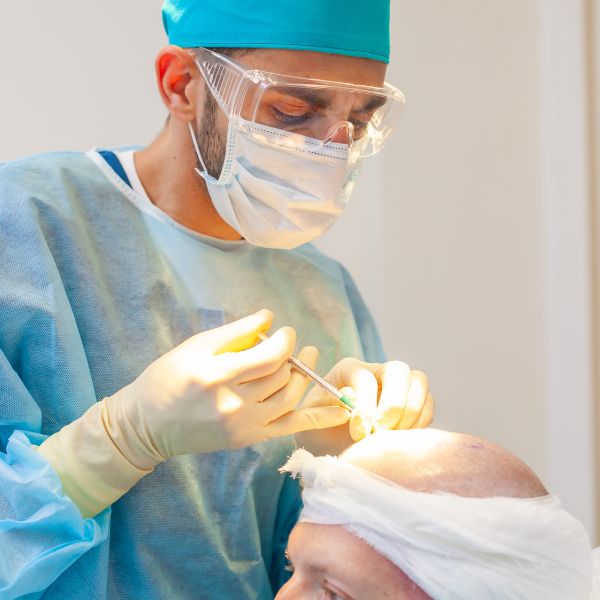
Before getting a hair transplant, each patient must go through a detailed blood test to assess their overall health and determine whether or not they are suitable for the hair transplant operation. These tests involve an HIV test as well and are performed to ensure the safety of both patients and the medical staff.
Is HIV test required for hair transplant?
HIV testing before a hair transplant may be necessary or not depending on various factors such as clinic policies, patient history, regional regulations, and infection control protocols.
Should I tell that I am HIV positive?
You should inform the healthcare facility about your HIV-positive status if you are planning to undergo a hair transplant. This will ensure the safety of both the healthcare professionals involved and yourself. Therefore, it is essential to note that even if you choose not to disclose your HIV status, it will still be detected during the pre-operation tests that are conducted. Furthermore, it is recommended that you inform the facility beforehand, which will allow you to design your hair transplant operation accordingly and avoid any unnecessary delays.
How much does HIV positive hair transplant cost in Turkey?
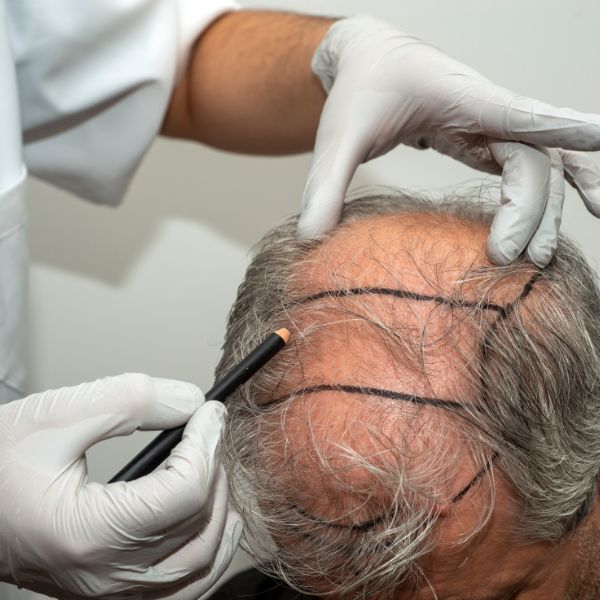
Turkey is known for offering affordable aesthetic procedures, and the HIV-positive hair transplant is no exception. This specialized operation requires careful attention to safety and detail, which is why it can be more expensive than a regular hair transplant. However, in Turkey, you can still get an HIV-positive hair transplant at a reasonable price, with costs ranging between $3,000 and $5,000.
How much does HIV positive hair transplant cost in other countries?
Although there are only a few hair transplant clinics that offer hair transplants for patients with HIV, some clinics in countries like the UK, the USA, and other European countries may offer the procedure at exorbitant prices due to the need for extra care and attention. For instance, an HIV-positive hair transplant in the UK may range anywhere between £7,000-£13,000 on average, while the cost of an HIV-positive hair transplant in the USA may be around $6,000-$15,000 on average.
Why is Turkey so cheap for hair transplant?
Turkey has become a well-known destination for affordable hair transplant procedures without compromising on quality. The low exchange rate, low cost of living, and the government’s regulations and support for the medical tourism industry make getting a hair transplant in Turkey much more affordable than in other countries. Additionally, the competitive atmosphere in hair transplant clinics in Turkey drives prices down, and many clinics offer all-inclusive packages.
Is HIV hair transplant safe in Turkey?
Getting an HIV hair transplant in Turkey is safe, provided that the necessary precautions are taken. The procedure is carried out only by experienced surgeons who specialize in this area, which ensures that the transplant is performed by qualified professionals. This is a huge relief for those seeking a hair transplant, as they can rest assured that they are in safe hands.
Is there any restrictions for HIV positive patients in Turkey?
There are no restrictions in Turkey for HIV-positive individuals to get a hair transplant. So, you don’t need to worry about any limitations. If you have any specific questions or concerns about HIV-positive hair transplants or if you need to take any special measures before the treatment, feel free to contact us.
What is the risk after a hair transplant?
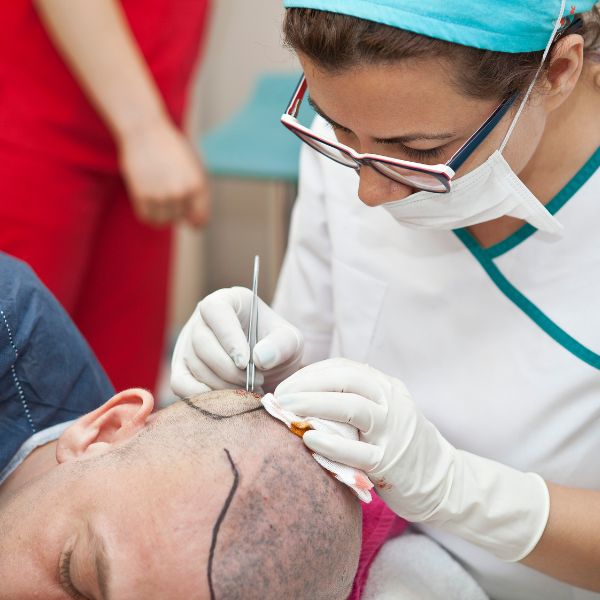
As with any medical procedure, hair transplants carry some risks, albeit minimal, such as infection, discomfort, pain, and others. It is important to note that HIV-positive hair transplants carry no additional risks compared to a regular hair transplant procedure. However, it is crucial to point out that the infection may affect HIV-positive patients more than a healthy individual after the procedure since their immune system is weaker.
Is hair transplant 100% safe?
When performed by a qualified and experienced medical professional, a hair transplant procedure has a safety rate of 97%. The safety of the procedure depends on various factors such as the surgeon’s expertise, the hygiene standards maintained by the clinic, and the quality of the equipment used for the procedure.
How do you prevent infection after hair transplant?
To prevent infection after a hair transplant, there are several essential steps you should follow. Firstly, avoiding excessive sweating in humid and dusty environments is essential. Secondly, staying hydrated is vital in minimizing the risk of infection. Thirdly, it is crucial to keep the donor area clean as it recovers. After the first day, you should wash your hair once or twice a day. By following these instructions, you can ensure that the process is safe and successful. Remember that proper hygiene and care are essential for the best results.
Who can not do a hair transplant?
Although hair transplant surgery can be a viable option for many people, it is important to consider certain limitations. For instance, individuals with autoimmune diseases may not be suitable candidates for the procedure. While hair transplant surgery is a relatively straightforward process that can produce excellent results, those who suffer from chronic health conditions such as heart disease, kidney or liver failure, diabetes, and others may not be ideal candidates for this surgery due to potential risks and complications associated with their health conditions. It is important to consult with a qualified healthcare professional to determine whether hair transplant surgery is right for you.
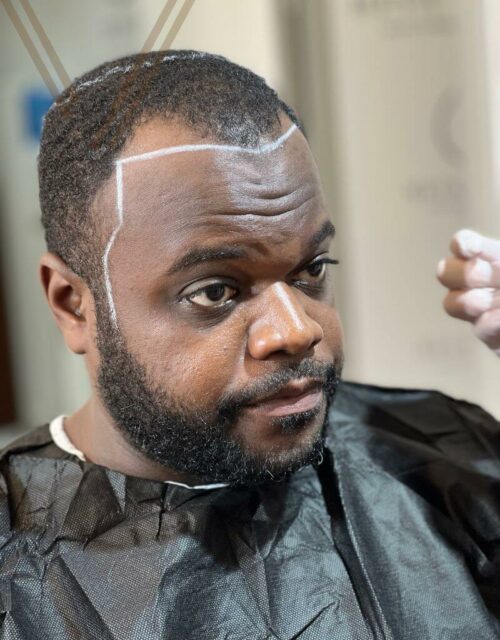
How does hair transplant surgery work for an HIV patient?
A hair transplant procedure follows the same process for individuals with HIV as it does for those without, granted that appropriate regulations and precautions are adhered to.
Are HIV patients satisfied with the results of hair transplantation?
Many patients who have HIV are happy with the results of hair transplantation. With the necessary precautions, procedures are now safer than ever. Generally, people who undergo hair transplantation, including those with HIV, can experience positive outcomes in terms of improved appearance and self-confidence. However, several factors can influence satisfaction, such as the surgeon’s skill, the quality of the transplantation procedure, the patient’s expectations, and overall health.
Can you get HIV from a hair transplant?
While it’s highly unlikely to contract HIV from a hair transplant procedure, it’s crucial to take necessary precautions to reduce the risk of any bloodborne infections. To ensure safety, medical facilities and healthcare professionals must strictly follow infection control protocols. This includes using sterilized equipment and adhering to universal precautions. All instruments used in hair transplantation should be thoroughly sanitized, and healthcare providers should use gloves and other protective measures to minimize the risk of infections. It’s important to remember that the risk of infection can be minimized by following proper hygiene and safety protocols.
Why wait any longer? If you desire higher confidence with a youthful look, Vantage Clinic offers everything you are looking for! Here, we take utmost care of our patients and do not refrain from any precautions to keep our patients with contagious diseases safe. Feel free to get in touch with us via our contact form or WhatsApp button below, we will be waiting to make mirrors friendlier!


